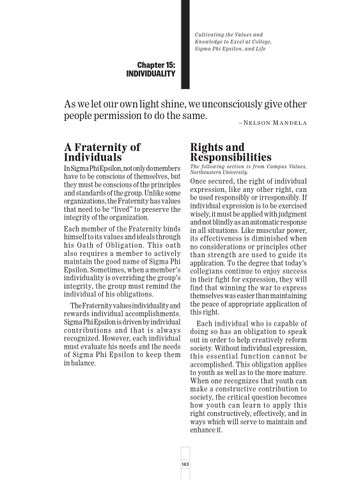Cultivating the Values and Knowledge to Excel at College, Sigma Phi Epsilon, and Life
Chapter 15: Individuality
As we let our own light shine, we unconsciously give other people permission to do the same.
~N e l s o n M a n d e l a
A Fraternity of Individuals
Rights and Responsibilities
In Sigma Phi Epsilon, not only do members have to be conscious of themselves, but they must be conscious of the principles and standards of the group. Unlike some organizations, the Fraternity has values that need to be “lived” to preserve the integrity of the organization.
The following section is from Campus Values, Northeastern University.
Once secured, the right of individual expression, like any other right, can be used responsibly or irresponsibly. If individual expression is to be exercised wisely, it must be applied with judgment and not blindly as an automatic response in all situations. Like muscular power, its effectiveness is diminished when no considerations or principles other than strength are used to guide its application. To the degree that today’s collegians continue to enjoy success in their fight for expression, they will find that winning the war to express themselves was easier than maintaining the peace of appropriate application of this right.
Each member of the Fraternity binds himself to its values and ideals through his Oath of Obligation. This oath also requires a member to actively maintain the good name of Sigma Phi Epsilon. Sometimes, when a member’s individuality is overriding the group’s integrity, the group must remind the individual of his obligations. The Fraternity values individuality and rewards individual accomplishments. Sigma Phi Epsilon is driven by individual cont r ibut ion s a nd t hat i s a lways recognized. However, each individual must evaluate his needs and the needs of Sigma Phi Epsilon to keep them in balance.
Each individual who is capable of doing so has an obligation to speak out in order to help creatively reform society. Without individual expression, th is essentia l f u nction ca n not be accomplished. This obligation applies to youth as well as to the more mature. When one recognizes that youth can make a constructive contribution to society, the critical question becomes how youth ca n lea rn to apply this right constructively, effectively, and in ways which will serve to maintain and enhance it.
143
